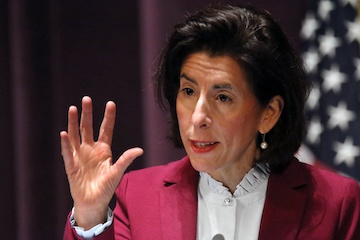The Biden administration is in talks with the European Union to avoid an escalation in a dispute over tariffs on European metals exports as the transatlantic alliance tries to repair their economic counterweight against China, people familiar with the matter said.
Commerce Secretary Gina Raimondo, on a call with EU trade chief Valdis Dombrovskis last week, inquired about what could be done to avoid a looming escalation of European tariffs, according to the people, who asked not to be named discussing private talks.

At issue is a high-profile dispute that started in 2018 under former President Donald Trump that saw the U.S. impose duties on steel and aluminum from Europe, Asia and elsewhere over risks to American national security. The EU has since retaliated and on June 1 is set to increase tariffs on a list of American products to 50%.
While Raimondo explained to Dombrovskis that the U.S. is not yet in a position to lift its tariffs on EU metals, she signaled that the Biden administration wanted to find a way to prevent further escalation and eventually remove the bilateral irritants, the officials said.
“The Europeans are not happy,” Raimondo said Wednesday on “The David Rubenstein Show: Peer-to-Peer Conversations” on Bloomberg Television. “I’ve had many discussions with my counterparts in the EU. They are our allies—Europe of course is not a threat to American national security.”
Waiting for Washington
According to the people familiar with Raimondo’s call with Dombrovskis, he stressed that European companies have been suffering from the U.S. tariffs, and it wouldn’t be possible to dial them back unilaterally or halt the EU increase in June without a U.S. concession.
A Commerce Department spokesperson didn’t respond to a request for comment.
EU officials say the bloc would only be able to withhold the upcoming tariff hike if the two sides reached an agreement to take mutual action such as temporarily suspending duties until a final deal is found—similar to the existing ceasefire in a separate transatlantic dispute over illegal aid to aircraft makers Boeing Co. and Airbus SE.
While the EU is eager to bring this dispute to an end and avoid a further escalation, officials in Brussels say they are waiting for a U.S. offer and whether that would be enough to prevent the levies increase.
U.S. officials, however, see it as highly unlikely that the Biden team could make a concession before June 1 and that finding a solution to removing the duties altogether will take a while longer.
The Biden administration, in its conversations with European counterparts, has stressed that the problem is a shared one and that they need to work together to get at the root cause of global overcapacity, largely caused by China.
“China’s oversupply and flooding their market and our market with cheap steel that is a national threat and we need to work with Europe to prevent China from doing that,” Raimondo said in the interview.
If the EU chooses to go ahead with the tariff increase in June even as the U.S. is engaged on a long-term solution, some officials believe it could send a troubling signal to the world ahead of a planned EU-U.S. summit in Brussels that President Joe Biden is set to attend.
Apart from Raimondo, U.S. Trade Representative Katherine Tai is engaged with her European counterparts as well.
Countering China
In a hearing before a Senate Appropriations subcommittee on Wednesday, she said the dispute is not a transatlantic one but instead evolves around the problem of Chinese overcapacity and how to address it together.
“What I’m hoping is that they see that problem, and they see it to be as serious a challenge to our ability to produce and compete in steel-making as we see it, and that working together we will be able to resolve these sets of tariffs,” Tai said. “We will be working together to get at more effective solutions to the problems that we have.”
Hard-hit by the retaliatory tariffs, U.S. whiskey makers for months have been lobbying for the dispute to be resolved and the duties to be removed.
A spokesperson for the European Commission reiterated that the EU proposed that both sides suspend all duties and retaliatory measures for six months to give time for a negotiated settlement. During their call on April 22, Dombrovskis and Raimondo agreed to work on possible solutions, including on the issue of steel overcapacity, the spokesperson said.
Trump imposed the 25% steel tariff, along with a 10% duty on aluminum imports, in March 2018 using section 232 of the Trade Expansion Act to justify the move. Some countries, including Brazil and South Korea, negotiated deals to avoid the tariff, and Trump dropped the duty for imports from Canada and Mexico. But the tariffs still apply for much of world.
Asked whether she expected movement on the steel and aluminum tariffs by Biden’s visit to Europe this summer, Raimondo said “I expect robust discussion between now and then.”

Follow us on social media: